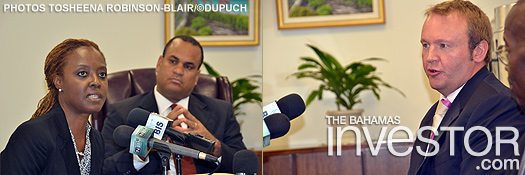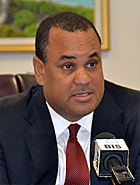| Source: Date: Updated: |
TheBahamasInvestor.com
Tuesday, January 15, 2013 Tuesday, January 15, 2013 |
The Bahamas announced Thursday last week that it achieved Status A in a global benchmark document signalling the jurisdiction’s commitment to fighting cross-border fraud and securities violations.
In June 2009, The Bahamas was granted Status B signatory to the International Organization of Securities Commissions (IOSCO) Multilateral Memorandum of Understanding (MMoU).
Status B signals a jurisdiction’s voluntary commitment to implement the legal framework necessary to be in compliance with the global standard-setting body’s MMoU, which concerns the consultation, cooperation and the exchange of information between securities regulators around the world.
Status A, which The Bahamas attained January 10, is proof of a country’s commitment to the principals enshrined therein.
“The announcement will undoubtedly benefit the country’s financial services industry, sending another signal to the world of the strength and quality of The Bahamas’ financial services regime,” said Michael Halkitis, Minister of State for Finance, upon the announcement. All financial regulators in The Bahamas fall under his Ministry.
He had this message for the industry’s practitioners: “I hope this announcement reinforces your commitment to maintaining the highest regulatory standards.”
Ryan Pinder, Minister of Financial Services, said the new development is a “landmark” achievement demonstrative of the existing level of cooperation between the private sector, regulators and central government.
“It now puts us not only on an even playing field, but gives us at a competitive advantage,” he added.
According to Pinder, being in compliance with international best practices in securities regulation removes The Bahamas’ last regulatory impediment in doing business with Brazil, Panama and other Latin American jurisdictions.
Latin America was identified as a key growth market for The Bahamas, and Brazil, in particular, was targeted for development of the funds and asset management industries.
On recent promotional trips to Brazil, executives of the Bahamas Financial Services Board (BFSB) were quizzed about the nation’s lack of a Signatory A status.
“To be in a position, where we can actually go back to Brazil and say we have it is momentous for The Bahamas and momentous for the industry,” said BFSB chairman Paul Winder.
Pinder confirmed that in recent months, The Bahamas has seen tremendous interest in clientele from Latin America. He believes The Bahamas will now certainly do more business with the LatAm market.
The Financial Services Minister is also expecting to see this latest development have a positive impact on The Bahamas International Securities Exchange (BISX), helping usher in a true international side to the market in achieving recognition from other overseas regulators.
The Securities Commission of The Bahamas (SCB) is one of only four regulatory agencies in the region who have the Signatory A status.
“Significantly, it is the first independent and sovereign nation [in the region] to gain this status,” confirmed SCB board chairperson Tonya Galanis. “This is a very important step in positioning The Bahamas as a leader among other regional centres.”
IOSCO has 204 members and regulates more than 95 per cent of the world’s regulatory securities market. The Bahamas has been a member since 1996.
Mechelle Martinborough, the commission’s legal counsel, explained that the MMoU allows the SCB “to enhance its arsenal in combatting securities law violations.”
Key to the success of the application was the promulgation of the Securities Act 2011, in addition to the passage of the Securities Industries Regulations January 9, 2012.
Sections 37 and 38 of the Securities Industries Act were important elements in meeting international standards, as they relate to information sharing.
Section 37 enhances the commission’s power to obtain information requested by an overseas regulatory authority except in cases where the information is protected by legal privilege or other legal restrictions. It also clarifies the circumstances under which the information provided by the commission can be used by the overseas regulatory authority.
Section 38 allows the securities commission to enter into a Memorandum of Understanding on an individual basis to enable the SCB to assist overseas regulatory authority in carrying out investigations, enforcement activities and supervisory duties.

Securities Commission of the Bahamas chair person Tonya Galanis (left), and BFSB chairman Paul Winder at a press conference January 10. MInister of State for Finance Michael Halkitis is pictured in the background. (Photo©Dupuch Publications/Tosheena Robinson-Blair)
tblair@dupuch.com











